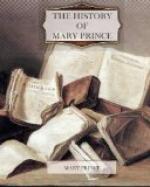NARRATIVE OF LOUIS ASA-ASA,
A CAPTURED AFRICAN.
The following interesting narrative is a convenient supplement to the history of Mary Prince. It is given, like hers, as nearly as possible in the narrator’s words, with only so much correction as was necessary to connect the story, and render it grammatical. The concluding passage in inverted commas, is entirely his own.
While Mary’s narrative shews the disgusting character of colonial slavery, this little tale explains with equal force the horrors in which it originates.
It is necessary to explain that Louis came to this country about five years ago, in a French vessel called the Pearl. She had lost her reckoning, and was driven by stress of weather into the port of St. Ives, in Cornwall. Louis and his four companions were brought to London upon a writ of Habeas Corpus at the instance of Mr. George Stephen; and, after some trifling opposition on the part of the master of the vessel, were discharged by Lord Wynford. Two of his unfortunate fellow-sufferers died of the measles at Hampstead; the other two returned to Sierra Leone; but poor Louis, when offered the choice of going back to Africa, replied, “Me no father, no mother now; me stay with you.” And here he has ever since remained; conducting himself in a way to gain the good will and respect of all who know him. He is remarkably intelligent, understands our language perfectly, and can read and write well. The last sentences of the following narrative will seem almost too peculiar to be his own; but it is not the first time that in conversation with Mr. George Stephen, he has made similar remarks. On one occasion in particular, he was heard saying to himself in the kitchen, while sitting by the fire apparently in deep thought, “Me think,—me think——” A fellow-servant inquired what he meant; and he added, “Me think what a good thing I came to England! Here, I know what God is, and read my Bible; in my country they have no God, no Bible.”
How severe and just a reproof to the guilty wretches who visit his country only with fire and sword! How deserved a censure upon the not less guilty men, who dare to vindicate the state of slavery, on the lying pretext, that its victims are of an inferior nature! And scarcely less deserving of reprobation are those who have it in their power to prevent these crimes, but who remain inactive from indifference, or are dissuaded from throwing the shield of British power over the victim of oppression, by the sophistry, and the clamour, and the avarice of the oppressor. It is the reproach and the sin of England. May God avert from our country the ruin which this national guilt deserves!
We lament to add, that the Pearl which brought these negroes to our shore, was restored to its owners at the instance of the French Government, instead of being condemned as a prize to Lieut. Rye, who, on his own responsibility, detained her, with all her manacles and chains and other detestable proofs of her piratical occupation on board. We trust it is not yet too late to demand investigation into the reasons for restoring her.




